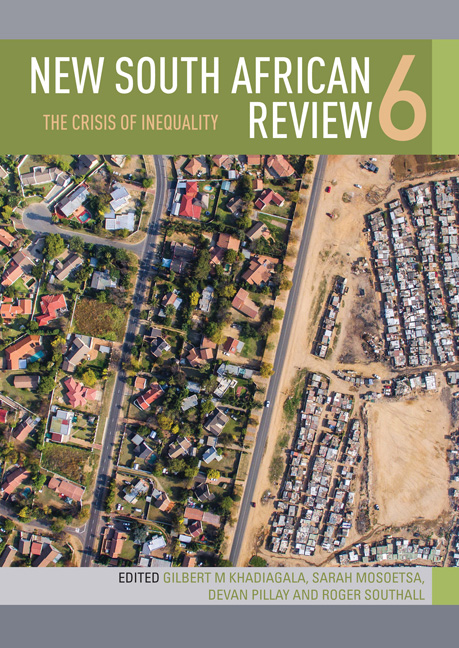Book contents
- Frontmatter
- Contents
- List of tables and figures
- INTRODUCTION: The global crisis of inequality and its South African manifestations
- PART 1 INEQUALITY AND CLASS: POLARITIES AND POLICIES
- PART 2 THE POLITICS OF INEQUALITY
- PART 3 SOCIAL DIMENSIONS OF INEQUALITY
- PART 4 LAND AND ENVIRONMENT
- CHAPTER 12 Spatial defragmentation in rural South Africa: A prognosis of agrarian reforms
- CHAPTER 13 Mining, rural struggles and inequality on the platinum belt
- CHAPTER 14 Challenging environmental injustice and inequality in contemporary South Africa
- CHAPTER 15 The geography of nuclear power, class and inequality
- Contributors
- Index
CHAPTER 13 - Mining, rural struggles and inequality on the platinum belt
from PART 4 - LAND AND ENVIRONMENT
Published online by Cambridge University Press: 23 March 2018
- Frontmatter
- Contents
- List of tables and figures
- INTRODUCTION: The global crisis of inequality and its South African manifestations
- PART 1 INEQUALITY AND CLASS: POLARITIES AND POLICIES
- PART 2 THE POLITICS OF INEQUALITY
- PART 3 SOCIAL DIMENSIONS OF INEQUALITY
- PART 4 LAND AND ENVIRONMENT
- CHAPTER 12 Spatial defragmentation in rural South Africa: A prognosis of agrarian reforms
- CHAPTER 13 Mining, rural struggles and inequality on the platinum belt
- CHAPTER 14 Challenging environmental injustice and inequality in contemporary South Africa
- CHAPTER 15 The geography of nuclear power, class and inequality
- Contributors
- Index
Summary
In South Africa, the Gini coefficient per capita (including salaries, wages and social grants) stands at a staggering 0.7. The richest 20 per cent of the population accounts for over 60 per cent of the national consumption while the poorest 20 per cent accounts for just 4.3 per cent of consumption (Stats SA 2014). The gross domestic product (GDP) per capita stands below R50 000 (NDP 2012). The national income distribution is also vastly skewed. The richest 20 per cent of the population earns about 70 per cent of the income, while the poorest 20 per cent take home a miserly 2.3 per cent of national income (NDP 2012).
The picture is even drearier in the former ‘homeland’ areas, where more than 16 million Africans live on communal land, under tribal (‘traditional’) authorities with weak tenure rights to land and its natural resources, high poverty levels, poor public services and limited infrastructural development. Women continue to be the most affected social category (NDP 2012). In 2011, 68.8 per cent of people living in rural areas were poor, while the figure for urban dwellers living in poverty was 39.9 per cent (Stats SA 2014: 33). With the highest levels of poverty reported in largely rural provinces – Limpopo (63.8 per cent), Eastern Cape (60.8 per cent) and KwaZulu-Natal (56.6 per cent) (Stats SA 2014: 36) – the legacy of the social, economic and political exclusion of Africans during apartheid still holds a firm grip over Africans in the former ‘homelands’. But intra-rural inequality remains less examined, particularly in how it connects the emerging modalities of resistance to mining expansion in communal areas. This chapter attempts to narrow the gap.
The chapter examines the emerging forms of rural struggles that continue to unfold in South Africa's former ‘homeland’ areas where platinum mining takes place. It provides an empirical account of how social relations over landed property have significantly shifted as a result of platinum mining expansion on rural land. Drawing on detailed ethnographic research conducted in two rural communities in North West and Limpopo provinces, the chapter demonstrates how the mining expansion has produced new forms of dispossession, differentiation and struggles over mining revenues. The findings also reveal resistance to mining expansion.
- Type
- Chapter
- Information
- New South African Review 6The Crisis of Inequality, pp. 236 - 251Publisher: Wits University PressPrint publication year: 2018



